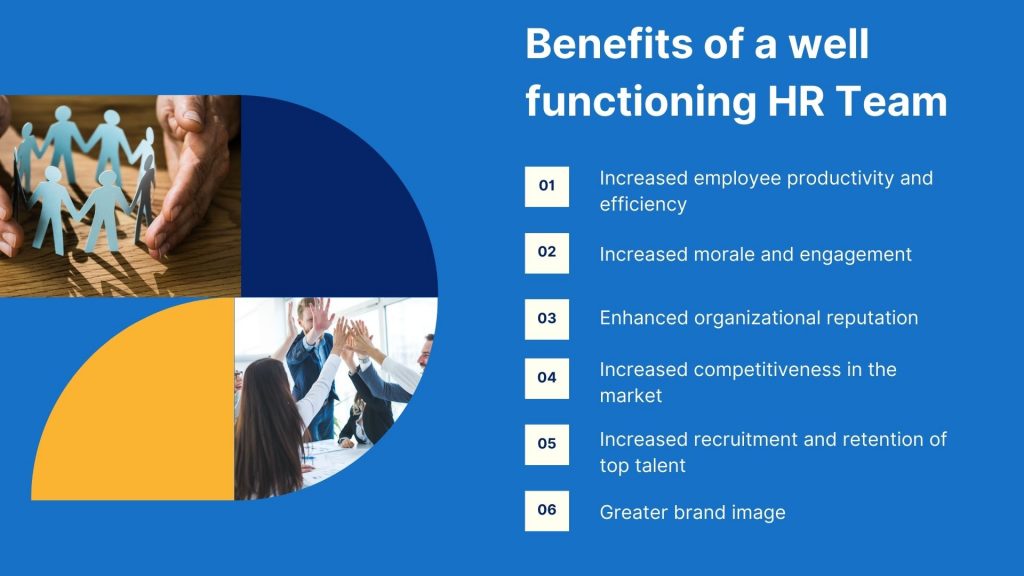Introduction
HR (Human Resources) is an essential department in any company, as it helps to manage and organize the workforce. However, it’s also critical that the team effectively manage employee morale and keep employees happy.
Creating an employee-centric culture that benefits both company and employees is the ultimate goal of HR. Moreover, it is crucial to ensure that its policies and procedures are followed and that employees are treated fairly. Apart from this, to ensure that HR processes run smoothly and employees are happy and productive, it is vital to properly assess and select the right personnel and communicate and coordinate between different departments. Furthermore, equip HR staff with the latest technologies, develop employees for future growth, and continually benchmark and improve HR processes.
As the backbone of any company, the HR team sets the tone for employee satisfaction, motivation, hiring, retention, and productivity. While having talented and hardworking employees is essential, other vital elements make up a successful HR team, from creating a positive company culture to compliance with regulations.
Attributes of a Successful HR Team
The effectiveness of their recruitment process, employee retention rates, and the ability to manage workplace conflicts determine the success of an HR team. However, there are other features of a successful HR team.
- A successful HR team is proactive and forward-thinking. They are always looking for ways to improve the company’s employee experience.
- Besides providing a good employee experience, they are strategic partners to the business. HR understands the company’s goals and vision and works to support them.
- They are experts in employment law and compliance. They keep the company up to date on regulations and ensure that employees are treated fairly.
- Also, they are champions of employee development. They help employees grow and progress in their careers and develop their skills.
- They create a positive and thriving workplace culture.
- A successful HR team can align the company’s goals with those of the employees.
- Moreover, they can attract and retain the best talent by creating a positive work environment.
- They can manage employee relations effectively.
- They can develop and implement fair and beneficial policies for both the company and the employees.
- Apart from policies, they can create a system where employees feel comfortable voicing their concerns and suggestions.
- They can manage employee files and records efficiently.
Top 9 Things that Define the Success of an HR Team
The HR team is one of the essential parts of a company, and it’s vital to have a well-functioning team that can support the company’s overall objectives. By reading through this blog, you’ll hopefully be able to gain a better understanding of what goes into making a successful HR team and how you can put this into practice in your own company.
Proper assessment and selection of HR personnel
HR is an essential department in any organization, and having the right people in the right roles is key to success. It’s critical to be aware of your company’s culture and expectations before meeting with candidates. Once you have selected a candidate, it’s essential to assess their fit for the role and ensure they are an excellent cultural fit.
Proper assessment and selection of HR personnel are essential to a successful HR program. If everything goes well, it’s time to start training them and get them up to speed on the company’s HR policies and procedures. You’ll ensure that your team is well-equipped to handle any challenges by doing this correctly.
Strong communication and coordination between different departments
Communication between HR and other departments is critical for two reasons. First, it ensures that all employees are aware of their rights and obligations under the company’s policies and regulations. Second, it ensures that HR can effectively coordinate the activities of other departments to achieve the company’s objectives. A strong HR team can also provide support to employees in case of any grievances or disputes and help to resolve them quickly and efficiently.
Ensuring compliance with statutory requirements
It’s essential to stay up to date with the latest statutory requirements – this will help keep your business running smoothly and compliant with the law. Specifically, make sure you have a compliance plan covering all the bases, from monitoring changes to data to responding to safety incidents and data breaches. It’s essential to have processes and protocols in place to react quickly and effectively in the event of any changes.
Finally, regularly keep an eye on your compliance status to make sure you’re on track. This can take time, but it’s essential to make sure you don’t fall behind – otherwise, you could find yourself in trouble.
Equipping HR staff with the latest technologies
HR Leaders play an essential role in the management of human resources. If technology isn’t a high priority for your organization, consider investing in a digital HR manager. This professional helps manage employee records, communicate with employees, and collaborate with other departments. Also, by using email, calendaring, and document sharing technologies, HR staff, can work more effectively and efficiently.
By arming HR staff with the latest technologies, you will help them keep up with the demands of their job and improve your organization’s overall performance.
Accurate job fitment and development of employees
The goal of HR is to ensure that employees are correctly positioned and developed to meet the company’s strategic priorities. Ensuring that employees have the right job fit is essential for success. This means ensuring they’re properly aligned with the company’s vision, mission, and goals. It also means finding a position that will allow them to reach their full potential and support their strengths (and avoid weaknesses).
Employee development is an essential element of any successful business. It can take many forms, from individual coaching sessions to group activities. Employers are increasingly looking for employees with specific skills, so it’s essential to make sure your job posting accurately lists the skills and experience you’re seeking. Additionally, it’s vital to offer skill-based training programs to help your employees develop their skills in essential areas of your business.
Contributing to a company’s overall profitability
Contributing to a company’s overall profitability is essential for the continued success of an HR team. The most critical intangible cost that goes noticed is the employee turnover cost. HR must actively work to reduce the employee turnover cost to add to the company’s bottom line. The best way to contribute is by choosing products that will have the most significant impact. Hence, getting a tool that can help you predict and prevent turnover proactively is the right way to go.
Continuous benchmarking and improvement of HR processes
By continuously benchmarking and improving the HR processes, you can ensure that your organization is up to date on the most current best practices. As a result, employees are satisfied, and the company’s strategic priorities are met. Moreover, by monitoring the process regularly, you can identify any areas that need attention and make the necessary changes. Further, ensuring an effective HR system means better alignment between the company’s strategic priorities and its human resources needs. So, keep the goal of employee satisfaction top of mind, and keep up the excellent work!
Creating an employee-centric culture
Creating employee-centric cultures is the future of business. It’s the type of culture that focuses on the individual and encourages them to feel valued and inspired. Such a culture always puts employees first, and everything rest follows automatically. A system where employees can speak up and share their thoughts is key to this type of culture. But it starts with providing them with the tools they need to succeed. This includes creating a supportive environment and providing them with their resources. It could also involve encouraging them to be vocal and share their thoughts. Moreover, you’ll be able to create an engaged workforce that can take on any challenge.
Mutual understanding and trust among team members
Teamwork is essential for any business – it’s what helps us achieve our goals. However, achieving team success often requires time and effort. It is worth it, though, as a team built on mutual understanding and trust can work together more effectively and achieve common goals quickly.
Team members need to develop a sense of trust and understanding to achieve this. This takes time, but it’s well worth the effort – especially when it leads to increased productivity and satisfaction. So, nurture team skills and relationships by developing mutual understanding and trust today.

Conclusion
It goes without saying, for any business, the success of its human resources (HR) team is paramount. Without an effective HR strategy, a company can quickly struggle to recruit the best talent, retain its top employees, and manage employee relations.
Thank you for reading. We hope that this blog has given you a better understanding of what makes a successful HR team and what actions you can take to improve the functioning of your HR department.
Ultimately, a successful HR team helps to foster a positive and productive work environment, which is conducive to employee retention and motivation.

